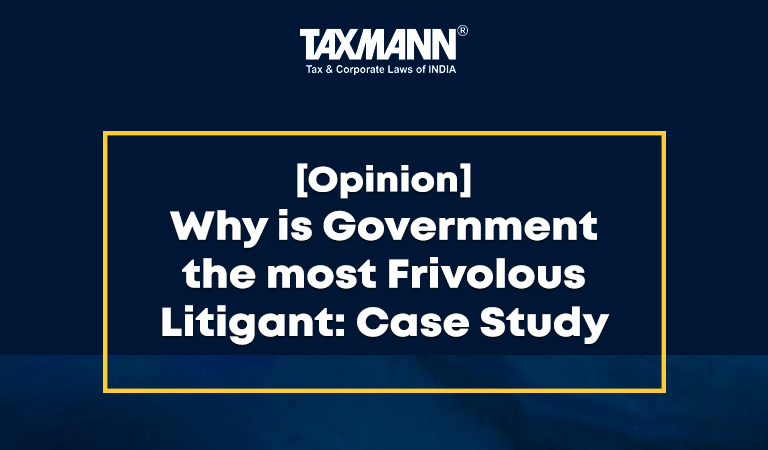[Opinion] Why is Government the most Frivolous Litigant: Case Study
- Blog|News|Income Tax|
- 3 Min Read
- By Taxmann
- |
- Last Updated on 2 September, 2022

Shivam Batra – [2022] 142 taxmann.com 15 (Article)
1. Introduction
It is an undisputed fact that Government is the largest litigant in the country. It is quite ironical that Government on one side promotes legal aid and alternate dispute resolution however, it itself is involved most of the wasteful litigation, various courts throughout the country has used terms such as ‘unfair’, ‘shocking’, ‘wasteful expenditure’ and ‘insensible’ for government’s zeal of getting involved in litigation instead of trying to get an issue resolved outside court.
This data is big enough to reflect the numerous government litigation that have been filed over the years and which have significantly slowed down the administration of justice. Any state which is founded upon the idea of the welfare of the people, high ideals of Justice, Liberty and Fraternity then the authorities are duty bound to implement the idea of welfare and thus achieve the idea of social justice. A welfare State undertakes to create a moral and intellectual climate for its people as a whole. It should nowhere become a reason to make life harder for people. Current Scenario is totally different and these principles look more theoretical and unachievable.
When we specifically study Taxation regime in India, we get to know that officials of Department are mostly unaware of the actions they are supposed to take when a dispute arises. They are even hesitant in following the guidelines earlier laid down by Courts as a result assesses are forced to take any dispute to court of law and because of this, cases get piled up. Department’s inaction results in burdening of judiciary and because of this many a times court has heavily come down at the Department.
2. Why courts are flooded by litigation from Government?
Answer to this question is very simple and straight forward which is that government litigates because it can as it has all the resources and not because it should. In reality, matters are not treated on their merit, instead it is a basic understanding that for department officials it is more justified and safer to discharge their liability under courts order as paying on their own can lead to them being held liable for their fault. Corruption is also one of the reasons as there are instances where due to litigation every level of government i.e., teams including the project, technical, finance and legal. Even the officials are mostly aware that department will eventually have to discharge their liability with interest, but still the matter is litigated.
Another and most important reason for this, which can be witnessed in many legal departments is lack of legal awareness. Government agencies frequently behave in a hyper-technical and mechanical manner, paying no attention to judicial precedents or developing legal matters. Sometimes appeals are brought based on outdated legislation and rulings. Prior to filing a lawsuit, an independent legal opinion is only occasionally requested. The value of the case, as opposed to its merits, determines the filing of the majority of cases.
Therefore, it can be concluded that due to this excessive government litigation, courts in India are burdened as a result administration of justice is delayed. Huge amount of expenditure is wasted. Apart from these reasons, the functioning of government departments are affected.
Click Here To Read The Full Article
Disclaimer: The content/information published on the website is only for general information of the user and shall not be construed as legal advice. While the Taxmann has exercised reasonable efforts to ensure the veracity of information/content published, Taxmann shall be under no liability in any manner whatsoever for incorrect information, if any.

Taxmann Publications has a dedicated in-house Research & Editorial Team. This team consists of a team of Chartered Accountants, Company Secretaries, and Lawyers. This team works under the guidance and supervision of editor-in-chief Mr Rakesh Bhargava.
The Research and Editorial Team is responsible for developing reliable and accurate content for the readers. The team follows the six-sigma approach to achieve the benchmark of zero error in its publications and research platforms. The team ensures that the following publication guidelines are thoroughly followed while developing the content:
- The statutory material is obtained only from the authorized and reliable sources
- All the latest developments in the judicial and legislative fields are covered
- Prepare the analytical write-ups on current, controversial, and important issues to help the readers to understand the concept and its implications
- Every content published by Taxmann is complete, accurate and lucid
- All evidence-based statements are supported with proper reference to Section, Circular No., Notification No. or citations
- The golden rules of grammar, style and consistency are thoroughly followed
- Font and size that’s easy to read and remain consistent across all imprint and digital publications are applied



 CA | CS | CMA
CA | CS | CMA
